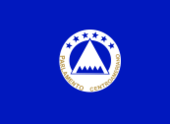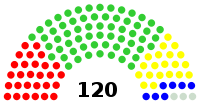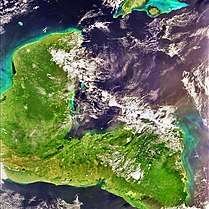Central American Parliament
The Central American Parliament (Spanish: Parlamento Centroamericano), also known as PARLACEN, is the political institution and parliamentary body of the Central American Integration System (SICA). Its headquarters are in Guatemala City.
Central American Parliament Parlamento Centroamericano | |
|---|---|
 | |
| History | |
| Founded | 28 October 1991 |
| Preceded by | Contadora Group |
| Leadership | |
President of the Central American Parliament | |
| Structure | |
| Seats | 123 deputies |
 | |
Political groups | Parliamentary Left (30) Democratic Center (47) |
| Meeting place | |
| Guatemala City | |
| Website | |
| www | |
| Part of a series on |
| Central America |
|---|
 |
|
Countries |
|
Culture |
|
Economy By country
|
|
Education By country
|
|
Environment
|
|
Politics and government Elections by country
Foreign relations by country
|
|
Transportation
|
|
Related topics
|
History
The PARLACEN origins date back to the Contadora Group, a project of the 1980s that sought to help resolve the civil wars in El Salvador, Guatemala, and Nicaragua. Although the Contadora group was disbanded in 1986, the idea of a greater Central American integration remained, giving rise to the Esquipulas II Agreement, which among other things, created the Central American Parliament. The Treaty establishing the Central American Parliament and other political bodies was signed in 1987; its first formal session was carried out on 28 October 1991 in Guatemala City.
The PARLACEN as a political body in the region is part of the Central American Integration System SICA, established by the Protocol of Tegucigalpa to the Charter of the Organization of American States (ODECA) signed on 13 December 1991. SICA has the fundamental aim to realize an integration that is political and ideological representative in a pluralistic democratic system that guarantees free elections and participation under equal conditions for political parties.
The historic Declaration of Esquipulas I, which was adopted by the presidents of the Central American states in the city of Esquipulas (Guatemala) on 25 May 1986, included the following declaration: "It is necessary to establish and complement activities that support understanding and cooperation with institutional structures. They shall make possible to strengthen the dialogue, the common development, democracy and pluralism as fundamental elements for peace in the region and the integration of Central America. Therefore the foundation of PARLACEN is necessary. Its members are elected freely by universal and direct elections through which the principle of political and participative pluralism is followed."
The agreement of PARLACEN and other political authorities was signed in October 1987 by Guatemala, El Salvador, Costa Rica, Nicaragua, and Honduras. In the beginning, it was an instrument which came into force for only three states (Guatemala, El Salvador and Honduras) on 1 May 1990. PARLACEN was formed on 28 October 1991 and has its head office in Guatemala City, Republic of Guatemala.
PARLACEN as the political organ of this region is part of the Central American Integration System (SICA). It was admitted into the Charta of the Organisation of the Central American States (ODECA) by the Protocol of Tegucigalpa signed on 13 December 1999. The basic aim of SICA is to realize the integration of Central America to make it a region of peace, freedom, democracy, and development.
Legal status and mission
PARLACEN is the regional assembly of SICA and acts as a permanent political organ to represent opinions and to carry out analyses and discussions about political, economic and cultural affairs of common interest, of basic conditions for democracy, peace, and the integration of Central America, as well to work out initiatives for its realization. It is charged with furthering human rights and international law, to achieve a peaceful coexistence within the framework of security and social welfare, a mission which is well-founded in representative and participative democracy, in pluralism, and in respect for national legislation and international law.
PARLACEN has the status of a legal entity according to international law.
Member states
The following countries comprise the PARLACEN:
Between 1998 and 2010, the Dominican Republic sent 22 appointed members. Since 2010, it has been a full member of the Central American Parliament with delegates elected directly by universal suffrage.[1] (See note)[2]
Panama
President of Panama Ricardo Martinelli vowed he would remove Panama from PARLACEN, fulfilling a campaign promise. On 11 December 2009, law 78 passed withdrawing Panama from PARLACEN, but a resolution of the Central American Court of Justice declared the law unconstitutional. The court said there is no mechanism to withdraw from the PARLACEN and Panama could not opt out. In January 2012, the Panamanian Supreme court re-affirmed that ruling[3] and Panama returned to PARLACEN. Panama also showed more interest in membership after SICA signed a free trade agreement with the European Union.
Observer status
Competences and tasks
The PARLACEN is the regional and permanent organ of political and democratic representation of the System of Central American Integration (SICA) with the main purpose to realize the Central American integration.
Competencies
- Proposal of legislation concerning the integration.
- Democratic control of the integration.
- Initiatives to deepen and amplify the integration.
Tasks
- Promoting the process of integration and leading the way to the greatest possible cooperation between the Central American states.
- Proposing draft treaties and agreements which are to be negotiated by the Central American states and forming an opinion of what the SICA proposes.
- Creating special commissions to determine the discordances between the states that could affect the integration.
- Helping to consolidate a democratic, pluralistic, and participative form of government in the Central American states.
- Promoting the validity of international law.
- Knowing the official executive authorities of SICA.
- Knowing the budgets of the institutions of SICA.
Bodies of PARLACEN
PARLACEN's organisational structure consists of the Plenum, the Board of Parliament, and the Secretary Office.
Plenum
The Plenum is the highest body of PARLACEN and is includes all representatives. The committees and parliamentary parties are also involved with its tasks.
The responsibilities of the Plenum are the following:
- Advice to the presidents' assembly concerning affairs of peace, security of Central America, and development of the region.
- Annual election of the board of parliament.
- Approval of the budget of PARLACEN.
- Assessment and decision concerning the reports of the board of parliament.
- Composition and approval of internal decrees of PARLACEN and other necessary regulations.
- Formation of working commissions.
- Proposal of drafts of contracts and agreements that are to be negotiated between the states of Central America.
- Annual discharge of the boards of the parliamentary standing committees.
- Other tasks which are assigned to it by its constitutive contract or its additional instruments.
The parliamentary committees
The parliamentary committees are parliamentary authorities who – in order to draw up a corresponding report – are supposed to conduct studies and examinations which are either within their sphere of competence or are directed to them by the board or the Plenum.
The working committees of PARLACEN can be structured as follows.
Permanent commissions are established in the internal rules to work on affairs of the commission with unlimited duration. The permanent commissions are formed of at most two representatives per state, not exceeding twelve members in total.
As of 2015, there were thirteen permanent commissions:[4]
- Commission of Agriculture, Fishing, Environment and Natural Resources
- Commission of Urban Development, Public Participation
- Commission of Education, Culture, Sports, Science and Technology
- Commission of Women, Children, Youth and Family
- Commission of Macroeconomics and Finance
- Commission of Tourism
- Commission of International Relations and Migration Affairs
- Commission of Health, Social Security, Population, Labour and Corporation Affairs
- Commission of Peace, Public Security and Human Rights
- Commission of Integration, Trade and Economic Development
- Commission of Legal Affairs and Regional Institutions
- Commission of Politics and Party Affairs
- Commission of Indigenous Peoples and Afro Descendants
There is also a delegation of EUROLAT.
Extraordinary commissions are established by the Plenum for affairs that are of special importance and institutional significance for PARLACEN as well as for the process of integration.
Special commissions are established by the board of parliament to handle special affairs.
Parliamentary groups
The parliamentary groups monitor the political trend of the Central American representatives and are organized according to the political orientation of their groups.
The parliamentary groups are founded by the adoption of an internal statute by the plenary assembly. The board of parliament registers each parliamentary group. The statute is published and states the group's ideological principles, the political objectives and the regulations.
In 2016-2017 there were four parliamentary groups: The Democratic Alliance, The Parliamentary Group of the Left, Centre-Democratic Integration and Democratic Integrationist Union,[5]
Board of parliament
The board of parliament is the executive body for decisions that emerge from the Plenum and is the administrative body of PARLACEN. It is expandable according to its internal rules.
The board of parliament is elected from the members. Its term is one year, made up of one president, five vice-presidents, and six secretaries.
The board makes its decisions by approval of a majority of its members. In the event of a tie, the votes of the presidency count as qualified majority. The presidency is filled by a rota system corresponding to the alphabetical order of the member states, starting with the state which holds the head office.
It is possible to appeal any resolution at the Plenum.
The tasks of the board are
- Consideration and handling of all requests for which PARLACEN is in charge.
- Conveying of the invitations for the ordinary and extraordinary meetings of the Plenum of PARLACEN.
- Draft of the budget – designated in Central American Pesos – for the routine work of PARLACEN.
- Realizing the resolutions of PARLACEN.
- Handing in the annual report about the execution of its duties and the result of its administration to the plenary as well as the report about the budget.
- Management and control of the secretary office and appointment of necessary personnel. Here, the equal treatment of all Central American states has to be taken into consideration.
- Handling of the economic and organizational affairs which affect PARLACEN.
- Proposal to the Plenum of regulating instruments which are required by the internal order.
- Creation of special commissions to carry out a task or realize a special function.
- Proper filling in of vacancies that occur in absence of a representative.
- Calling of the deputy representative in case of vacancies.
- Proposal of a suitable list of candidates for the appointment of the internal and external accountants of PARLACEN to the plenary.
- Formation of delegations for official missions. This has to be done in accordance to the regulating norms for the integration of special missions of PARLACEN.
- Establishing its own internal rules
- Dividing tasks among its members.
- Other tasks which are assigned to the board by the constitutive contract or by additional instruments.
Secretary office
The secretary office is the technical-administrative organ of PARLACEN and is divided into three sections, which have the following basic functions and responsibilities:
The secretary office for parliamentary affairs handles and obeys the decisions of PARLACEN. It reports to the Plenum on a regular basis and is of technical assistance to the Plenum as well as to the commissions in all of their activities. It coordinates and manages the advice of the commissions and has to assist the extended board with developing the agenda for Plenum meetings when necessary.
The secretary office for administration and finance has to administer all branches, manager's offices, departments and administrative units, as well as the personnel of PARLACEN, and has to control the proper administration of its resources.
The secretary office of the board offers technical help to the board in questions relating to the responsibilities of and the topics determined by the board.
Presidents of PARLACEN
| President | Term in Office | Country |
|---|---|---|
| Roberto Carpio Nicolle | October 1991 – October 1992 | Guatemala |
| Ilsa Díaz Zelaya | October 1992 – October 1993 | Honduras |
| José Francisco Merino López | October 1993 – July 1994 | El Salvador |
| Víctor Augusto Vela Mena | July 1994 – October 1994 | Guatemala |
| Roland Valenzuela Oyuela | October 1994 – December 1995 | Honduras |
| Raúl Zaldívar Guzmán | December 1995 – October 1996 | Honduras |
| Ernesto Lima Mena | October 1996 – October 1997 | El Salvador |
| Marco Antonio Solares Pérez | October 1997 – October 1998 | Guatemala |
| Carlos Roberto Reina | October 1998 – October 1999 | Honduras |
| José Ernesto Somarriba Sosa | October 1999 – October 2000 | Nicaragua |
| Hugo Guiraud Gargano | October 2000 – October 2001 | Panama |
| Rodrigo Samayoa Rivas | October 2001 – October 2002 | El Salvador |
| Victor Augusto Vela Mena | October 2002 – October 2003 | Guatemala |
| Mario Facussé Handal | October 2003 – October 2004 | Honduras |
| Fabio Gadea Mantilla | October 2004 – October 2005 | Nicaragua |
| Julio Enrique Palacios Sambrano | October 2005 – October 2006 | Panama |
| Ciro Cruz Cepeda Peña | October 2006 – October 2007 | El Salvador |
| Julio Guillermo González Gamarra | October 2007 – October 2008 | Guatemala |
| Gloria Guadalupe Oquelí Solórzano de Macoto | October 2008 – October 2009 | Honduras |
| Jacinto José Suárez Espinoza | October 2009 – October 2010 | Nicaragua |
| Dorindo Jayan Cortez Marciaga | October 2010 – October 2011 | Panama |
| Manolo Pichardo | October 2011 – October 2012 | Dominican Republic |
| Leonel Búcaro | October 2012 – October 2013 | El Salvador |
| Paula Rodríguez | October 2013 – October 2014 | Guatemala |
| Armando Bardales | October 2014 – October 2015 | Honduras |
| José Antonio Alvarado Correa | October 2015 – October 2016 | Nicaragua |
| Priscilla Weeden de Miró | October 2016 – October 2017 | Panama |
| Tony Raful Tejada | October 2017 – October 2018 | Dominican Republic |
| Irma Segunda Amaya Echeverría | October 2018 – October 2019 | El Salvador |
| Juan Alfonso Fuentes Soria | October 2019 – January 2020 | Guatemala |
| Nadia Lorena De León Torres | January 2020 – October 2020 | Guatemala |
Elections
The 20 elected members representing every member state the Central American Parliament are elected at the same time as the presidential elections of the member state according to article 2 of the Internal Regulations of the Central American Parliament. The former president of every member state, as well as every vice-president and prime minister, are also de jure members of the PARLACEN from the end of their term till the end of their successor's term.[6]
- 24 November 2013: Honduras
- 4 May 2014: Panama
- 1 March 2015: El Salvador
- 6 September 2015: Guatemala
- 15 May 2016: Dominican Republic
- 6 November 2016: Nicaragua
See also
- Andean Parliament
- Latin American Parliament (Parlatino);
- Mercosur Parliament.
References
- Directorio de diputados Archived 6 October 2011 at the Wayback Machine
- "Juramentan a diputados dominicanos al Parlacen". listindiario.com. Retrieved 13 October 2014.
- "Panamá retornará al Parlamento Centroamericano (Parlacen)". Telemetro. Retrieved 13 October 2014.
- Comisiones 2015 - 2016 Archived 21 March 2016 at the Wayback Machine, Central American Parliament Website, 10 February 2016
- Grupos Parlamentarios 2014-2015< Archived 18 December 2015 at the Wayback Machine, Central American Parliament Website, 16 September 2015
- Reglamento Interno del Parlamento Centroamericano Archived 5 October 2013 at the Wayback Machine
External links
https://www.efe.com/efe/america/politica/el-exvicepresidente-guatemalteco-alfonso-fuentes-soria-es-nuevo-presidente-del-parlacen/20000035-4096093 https://es.wikipedia.org/wiki/Alfonso_Fuentes_Soria https://republica.gt/2019/10/25/alfonso-fuentes-soria-nuevo-presidente-del-parlacen/ https://www.soy502.com/articulo/exvicepresidente-guatemala-nuevo-presidente-parlacen-63338 http://www.parlacen.int/Prensa/Prensa/tabid/145/EntryId/3720/Doctor-Alfonso-Fuentes-Soria-fue-electo-Presidente-del-PARLACEN.aspx https://es.wikipedia.org/wiki/Parlamento_Centroamericano http://www.parlacen.int/Prensa/Prensa/tabid/145/EntryId/3813/CONCLUDING-THE-PERIOD-OF-SESSIONS-OF-THE-BOARD-OF-DIRECTORS-OF-JANUARY.aspx https://republica.gt/2020/01/16/nadia-de-leon-torres-se-queda-con-la-presidencia-del-parlacen/
- http://www.parlacen.int/Prensa/Prensa/tabid/145/EntryId/2149/Presidenta-Priscilla-de-Miro-Fue-Juramentada-en-el-Cargo-Junto-con-Integrante-de-su-Junta-Directiva-2016-2017.aspx
- http://www.tvn-2.com/nacionales/Panamena-Priscilla-Weeden-Miro-Parlacen_0_4606789337.html
- https://www.google.com.mx/#q=priscilla+weeden+de+miro